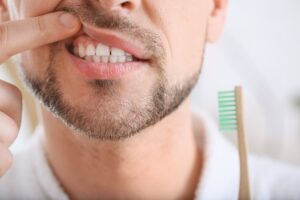Stress has become an integral part of our modern lives, affecting us physically, emotionally, and mentally. While its impact on overall health is widely acknowledged, many people are unaware of the adverse effects stress can have on oral health. The mouth is a gateway to the body, and the relationship between stress and oral health is undeniable. In this blog post, Vibrant Square Dental will explore the various ways in which stress affects our oral health and discuss preventive measures to maintain a healthy mouth in the face of stress.
1. Bruxism and Teeth Grinding
One of the most common ways stress affects oral health is through bruxism, a condition characterized by grinding or clenching of teeth. Stress can lead to heightened muscle tension, causing individuals to unconsciously grind their teeth, usually during sleep. The excessive pressure exerted on the teeth can result in tooth fractures, enamel erosion, jaw pain, and temporomandibular joint disorder (TMJ). If you notice symptoms such as headaches, worn tooth surfaces, or jaw pain, consult a dentist who can provide a customized mouthguard to protect your teeth from further damage.
2. Gum Disease
Stress weakens the immune system, making individuals more susceptible to infections, including gum disease. Research has shown a direct correlation between stress and the development and progression of periodontal disease. High-stress levels can impair the body’s ability to fight off bacteria, allowing plaque to accumulate and gingivitis to set in. If left untreated, gingivitis can progress to periodontitis, causing gum recession, bone loss, and even tooth loss. Practicing good oral hygiene, including regular brushing, flossing, and professional cleanings, is crucial in preventing gum disease. Additionally, stress management techniques such as exercise, meditation, and therapy can help reduce the impact of stress on oral health.
3. Dry Mouth
Chronic stress can lead to a condition known as dry mouth or xerostomia, where there is decreased saliva production. Saliva plays a vital role in maintaining oral health as it helps neutralize acids, washes away food particles, and prevents the growth of harmful bacteria. When saliva production is reduced, the mouth becomes dry, increasing the risk of tooth decay, bad breath, and oral infections. To combat dry mouth, stay hydrated, avoid alcohol and tobacco, chew sugar-free gum, and consider using saliva substitutes or artificial saliva products. Additionally, speaking to a healthcare professional about managing stress levels can help alleviate dry mouth symptoms.
4. Poor Oral Hygiene and Neglected Dental Care
When stress takes a toll on our mental well-being, it often results in neglecting self-care routines, including oral hygiene and regular dental check-ups. Skipping brushing and flossing or missing dental appointments can have severe consequences for oral health. Poor oral hygiene allows plaque to accumulate, leading to tooth decay, gum disease, and other oral health issues. It is crucial to maintain consistent oral hygiene habits, even during times of stress. Establishing a routine, setting reminders, and seeking support from loved ones can help ensure that oral care remains a priority.
Stress affects various aspects of our lives, and oral health is no exception. From teeth grinding and gum disease to dry mouth and neglected dental care, stress can significantly impact our mouths. By recognizing the connection between stress and oral health and implementing preventive measures, we can maintain a healthy smile even during challenging times. Remember, a calm mind contributes to a healthy mouth!
At Vibrant Square Dental in Vaughan, ON, we urge you to get in touch with us today at 905-553-3004 to book an examination and consultation. Our experienced team will evaluate your oral condition, engage in a detailed discussion about suitable treatment options, and deliver the essential care required to enhance the health of your gums. Don’t hesitate any longer—reach out to us now and take the initial stride toward revitalizing your overall oral well-being.







